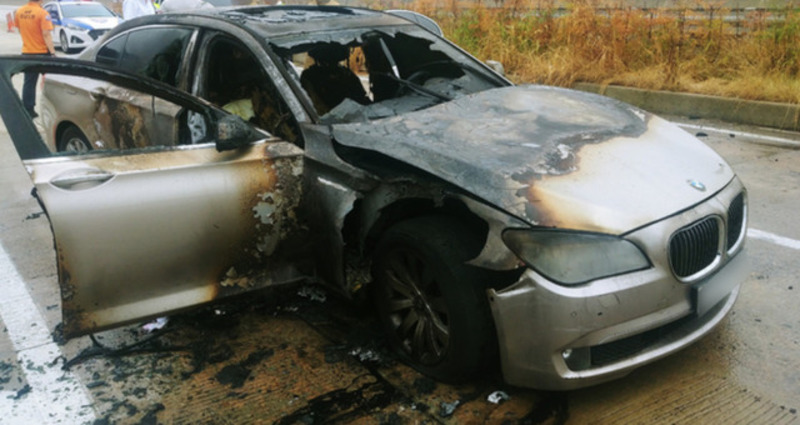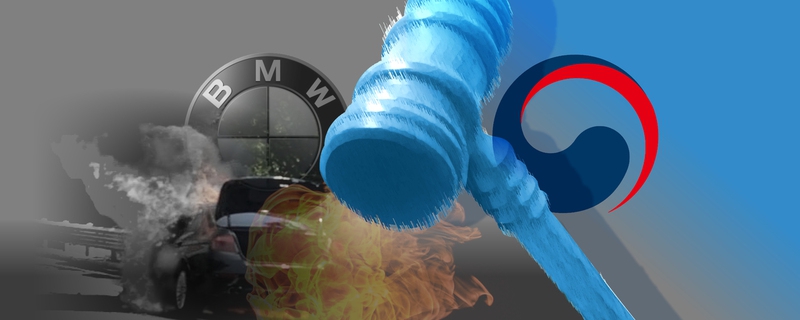Posted on : Sep.9,2018 15:57 KST
Modified on : Sep.9,2018 16:15 KST
Additional measures would require mandatory data report regarding vehicle defects
The South Korean government plans to impose penalties amounting to three percent of sales for automobile companies that cover up or downplay production defects and increase the maximum compensation to “five to ten times the associated damages” from its current three times in the wake of a series of fires involving BMW vehicles.
Additional measures include the institution of mandatory submission of data about vehicle defects by their makers and new authority for the government to issue driving restriction and sales suspension orders.
The plan for reforms to the automobile recall response system was finalized and announced on Sept. 6 at a governance issue review and coordination meeting presided over by Prime Minister Lee Nak-yeon. The recall system improvement measures were developed jointly by related ministries in response to criticisms about the inadequacies of legal and regulatory measures and the government’s failure to “do its job” despite growing fears over the BMW fires.
As a first step, the plan greatly increases the legal responsibilities of automobile makers. The plan involves amending the law to allow the assessment of up to three percent of sales in penalties when an automaker knowingly conceals or downplays a production flaw. While the current system allows for sentences of up to 10 years in prison and fines of up to 100 million won (US$89,000), critics have contended that the penalty-based system is inefficient.
The maximum penalty for companies dragging their heels in cases of a recall is to be raised to three percent from its current one percent, while obligations for automakers to submit related data are to be intensified. Data will have to be submitted as needed at all stages once the government launches an investigation after detecting evidence of a vehicle defect.
Companies have tended not to comply with KTSA requests for data on vehicle defects
Companies have tended not to comply with Korea Transportation Safety Authority (KTSA) demands for data before a recall investigation order is issued by the Ministry of Land, Infrastructure and Transport (MOLIT). Indeed, BMW twice refused requests to provide data to KTSA after it began its investigation into the fires. In the future, companies will be subject to penalties of 10 million won (US$8,900) each time they fail to comply with a document submission request.
The punitive damage system is also to be intensified, with the relevant laws amended to require compensation amounting to five to ten times the associated damages in cases where an automaker’s knowing refusal to respond to a defect results in severe harm to persons or property. The current system – which caps compensation at three times the associated damages and has not been applied in cases of property damage – has been repeatedly blasted as a “slap on the wrist” approach.
MOLIT plans to go to work soon holding discussions with the Fair Trade Commission and Ministry of Justice to amend the related laws. On the matter of the new terms applying to the BMW fires, MOLIT transportation and distribution office chief Kim Gyeong-wok said, “To apply them to BMW, we would need to hold in-depth discussions on whether they could be applied retroactively.”
The changes provide a legal basis for the Minister of Land, Infrastructure and Transport to impose vehicle driving restrictions and sales bans in cases like the BMW fires where the vehicles subject to a recall pose serious potential risks to public safety, while also raising the stature of the KTSA as the agency responsible for investigating automobile defects.
“After gathering an ample base of opinions from experts, the National Assembly, and media, we have devised measures to improve the recall system, and we will work without delay to amend the related lays and establish a cooperative system with related ministries,” said Minister of Land, Infrastructure and transport Kim Hyun-mi.
 |
|
A BMW vehicle that caught on fire while on the road. (Hankyoreh archives)
|
Critics point out new measures are still less stringent than those of other countries
While the measures are seen as being generally focused on protecting consumer interests and placing a greater weight of responsibility on automakers for vehicle defects, some observers content that they are still less stringent than those of the US and other countries. In particular, some are claiming the ceiling on damages and the amounts of fines and penalties imposed on automakers should be increased to boost the effectiveness of punitive measures.
In response, a MOLIT official said, “We take seriously the comments about limitations to the recall system and will work to reform it.”
By Hong Dae-seon, staff reporter
Please direct comments or questions to [english@hani.co.kr]










